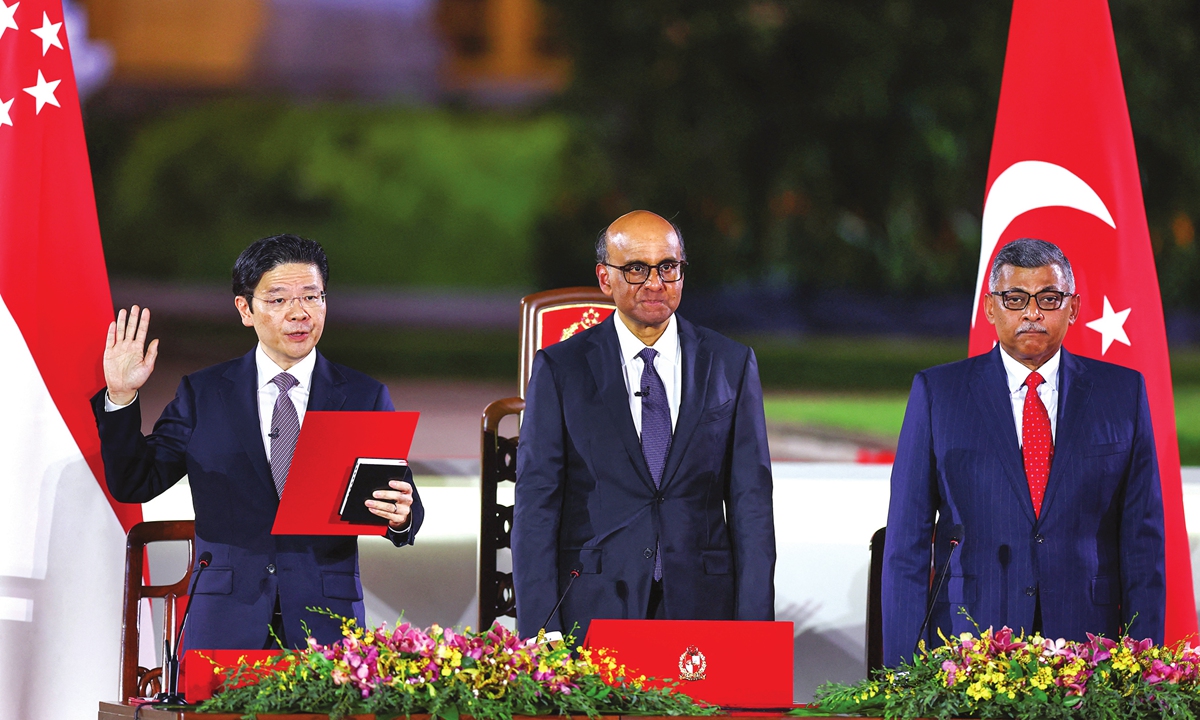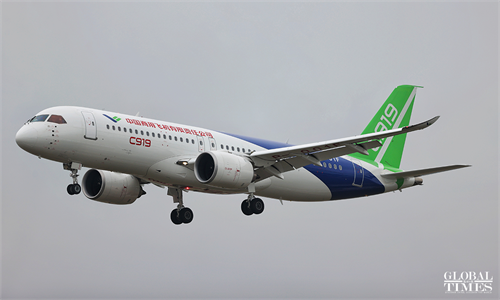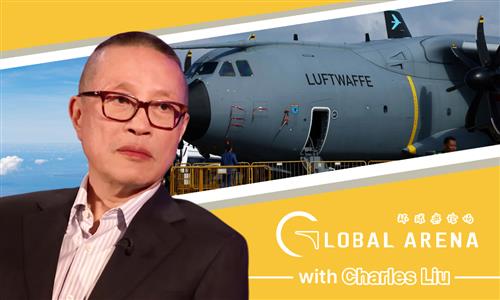Lawrence Wong sworn in as Singapore's new PM, expected to 'continue balanced foreign policy approach'

Lawrence Wong is sworn in at the Istana on May 15, 2024, as Singapore's fourth prime minister, succeeding Lee Hsien Loong. Photo: VCG
Lawrence Wong was sworn in on Wednesday as Singapore's fourth prime minister, succeeding Lee Hsien Loong who has stepped down after leading the Asian financial hub for two decades.Lawrence Wong will most likely continue to uphold the city-state's neutral and balanced foreign policy in navigating the China-US competition in the Asia Pacific region, which aligns with Singapore's best national interests, according to Chinese observers on Wednesday.
Lee Hsien Loong, 72, on Monday submitted his resignation to Singaporean President Tharman Shanmugaratnam, Xinhua reported.
Wong, 51 will retain his current position as finance minister and takes charge of a country led for two decades by Lee Hsien Loong, the 72-year-old son of Lee Kuan Yew, the founder of modern Singapore who stayed in politics until his death in 2015.
Wong, a civil servant turned politician, came to prominence while coordinating Singapore's successful fight against COVID-19, the AP reported.
When asked if Wong's US educational background would impact his foreign policy preferences, Xu Liping, director of the Center for Southeast Asian Studies at the Chinese Academy of Social Sciences, told the Global Times on Wednesday that he believes Wong will continue to uphold Singapore's strategy of balancing major powers, which aligns with Singapore's national interests.
Xu noted that Singapore has very complex and profound political, security and economic relationships with both China and the US. Therefore, any act of choosing sides would severely impact Singapore's delicate balancing position, which it cannot afford.
China has been Singapore's largest trade partner for 11 consecutive years since 2013, and the US is the leading source of foreign direct investment and top services export market for Singapore.
Ties with the US, China, Malaysia and Indonesia are four of Singapore's most important bilateral relationships, former prime minister Lee Hsien Loong previously said.
Singapore's incoming prime minister said in a recent interview with local media that "the unipolar moment for America has ended. While everyone talks about moving into a multipolar world, it has not yet reached a stable equilibrium." He emphasized that navigating this new global environment will require Singapore "to be more thoughtful, careful, nimble, and to find ways to avoid getting caught up in the geopolitical currents."
Wong also stressed during an interview with the Economist that Singapore is not an ally of the US, despite the two countries' close military links. He said the Republic is neither pro-China nor pro-America, but "pro-Singapore."
Singapore has long upheld its "one China" policy and opposed Taiwan independence, Wong noted. "And we do not allow ourselves to be made use of for any causes supporting Taiwan independence."
"At the end of the day, we have to be guided by what is in Singapore's national interest and do so in a way that is consistent and principled," he told local media.
Even though Wong has a Western education, it only means he has a better understanding of the West. He has also visited China multiple times. Thus, his main foreign policy will likely remain unchanged, Xu pointed out.
Wong said in Tianjin during the visit that Singapore-China relations enjoy a strong momentum of development, and Belt and Road cooperation has yielded fruitful results.
The Singaporean side is willing to work with China to further strengthen exchanges at all levels, deepen the synergy of development strategies, give full play to the role of Singapore-China bilateral cooperation mechanisms, and push for new development in bilateral relations. The two sides need to jointly promote free trade and regional openness and inclusiveness, Wong said.
Chinese observers speculated that under the leadership of Wong and his new government, China and Singapore will continue advancing their current intergovernmental cooperation projects and further strengthen collaboration in areas such as the digital economy and the green economy. Singapore can play a more significant role with China's accession to the Comprehensive and Progressive Agreement for Trans-Pacific Partnership, also known as the CPTPP free trade deal.
Xu believes that in the future, cooperation between China and Singapore should be strengthened on three levels: bilateral, multilateral, and regional. Particularly, Singapore will play a crucial role in advancing China-ASEAN cooperation, he said.




